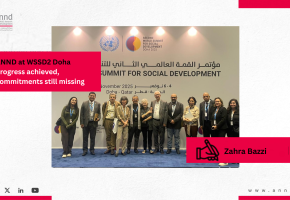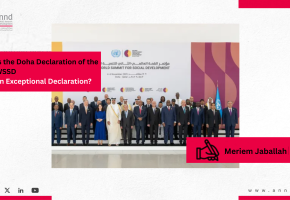
The Arab NGO Network for Development position on the new Agenda for the Mediterranean
The Arab NGO Network for Development position on the new Agenda for the Mediterranean
Read below or click here to download pdf
On 9 February 2021, the European Commission and the High Representative adopted a joint communication entitled new Agenda for the Mediterranean. The Renewed partnership communication starts with a flashback to 25 years ago, takes the reader to the adoption of the Barcelona Declaration and the commitment of both partners in turning the Mediterranean basin into an area of dialogue, exchange and cooperation, guaranteeing peace, stability and prosperity. It recognizes the interdependence of both partners and the need to work in a spirit of partnership to turn common challenges into opportunities, in mutual interest.
Accordingly, it sets range of actions along five policy areas: a) human development, good governance and the rule of law, b) strengthen resilience, build prosperity and seize the digital transition, c) peace and security, d) migration and mobility and e) green transition: climate resilience, energy, and environment. Compared to the 2015 ENP Review, these five policy areas are broader with additions of human development component; moving from stabilization to strengthening resilience; expanding security dimension to peace component and last but not least with emphasis on digital and green transition- reflecting the overarching European Commissions EU Green Deal policy. A 10-page joint staff working document within the framework of the “Economic and Investment Plan (EIP) for the Southern neighbors” accompanies the new agenda and includes a series of preliminary flagship investments and projects at multi-country, regional or in partner country level, under four of the abovementioned five priority areas. The Working document notes that these initiatives could be financed under the new financing instrument, Neighborhood, Development and International Cooperation Instrument (NDICI), and are considered indicative, non-exhaustive.
Taking into consideration both the Communication and the Working Document; especially set of flagship initiatives, modalities and tools promoted, one can notice that rather than a new, we have a renewed agenda, and rather than transformation, what is proposed is set of continuation and transition actions. Nevertheless, merely by looking at socio-economic, political and cultural indicators, the global need is addressing structural and systematic challenges. The COVID-19 pandemic highlighted the multidimensional systemic and fundamental flaws and the EU, as a global actor should take this as an opportunity to propose alternatives with a comprehensive, integrated and rights-based approach. Such an approach should make the strong link between the economic, social, environmental, political and cultural dimensions. Whereas the flagship action list is indicative, given that the approach both in the new agenda and the initiatives proposed are not groundbreaking, the Arab NGO Network for Development raises following issues of concern:
First of all, setting priorities for the Partnership should be the outcome of a structured, inclusive, participatory and transparent process ensuring the engagement of all relevant stakeholders and move away from simple, limited, consultative exercises. To ensure a “new” agenda rather than a repacking of old recipes, this exercise should be built on a genuine monitoring and evaluation framework through developing benchmarks and indicators within the broader Sustainable Development framework. This could help identify gaps in implementation and develop transformative actions in response. 25 years of experience as well as decades-long multidimensional development challenges taught a lot to both partners. For sure many at policy level but one key lesson-learnt is that Brussels-centered policy initiatives do not result most effective outcomes at the other side of the Mediterranean. Southern partner countries, who lack legal, regulatory framework ensuring citizen participation should benefit from a partnership with the European Union the sui generis institution built on fundamental human rights promotion, to ensure that those who are most silenced and those who are most in need are heard in the design, planning and implementation of policy priorities and initiatives.
Socio-economic challenges of the Southern partners are well recognized by the European Union and a long-term recovery through “Economic and Investment Plan for the Southern Neighbors” is envisaged. Resilient- sustainable and connected economies are key in this regard. Nevertheless, in order to address structural and systemic challenges, the starting point is by enhancing productive capacities and support initiatives in Southern partner countries to move away from rentier economies to diversified, productive national economies. Economic policies implemented in the partner countries, and trade, investment and privatization policies promoted in return have not allowed this shift to happen. Unless the limited policy space due to the conditionalities set by international actors, including the Trade and Investment Framework of the EU is addressed; sustainable economies cannot be achieved.
In relation to human development, rule of law and good governance, flagship initiatives indicate well-functioning, fair, transparent and accountable civil and judicial administration contribute to increasing sustainability, reducing inequality and enhancing well-being for all people. Whereas reforms and measures proposed on enhancing transparency, ensuring leaving no one behind, addressing discrimination and increasing civic participation are crucial, this starts with restoring the role of the state and public sector. The COVID19- pandemic made it clear that there is no, and cannot be, alternative to the state. The state has the primary responsibility to ensure justice and dignity for its citizens and its role is principal to ensure the full enjoyment of the rights and freedoms. Therefore, the initiatives under the partnership should allow the partner countries to address weak governance and develop set of policies and programs within a comprehensive national development plan to address inequalities and injustices. Adoption of redistributive policies including fair and just tax system, including progressive income taxes and taxes on wealth, and the adoption of universal social protection systems come at the forefront in this regard. The state should have the ability to eradicate different forms of tax avoidance and evasion and to stop the illicit capital flows as well.
The communication frames education and health under the delivery of inclusive, efficient, and effective “social services”. The consideration of these fundamental human rights as services in brings together private investors role, through blending mechanisms, which is not a new mechanism. Yet, within the blending finance and the promotion of public-private partnerships, there is no direct and explicit objective of achieving sustainable development, putting human rights prior to profits. At the level of affordability, provision of education and health by private investors is not new to the region and is at the center of the injustices and inequalities. In relation, with regard to health, it is impossible to omit the COVID-19 and vaccine debate. The Communication recognizes that vaccines are a global common good and vaccination is what will help to put an end to the pandemic worldwide. Whereas initiatives for setting up a mechanism for sharing some of the 2.3 billion doses secured by the EU is noted, it is important to first acknowledge that the problem is not limited quantities of vaccine but rather that the manufactures are not willing to liberate the patents protected by the TRIPs agreement although they benefited from the public finance and subsidies, to produce the vaccines. Aiming at supporting neighbors’ access to vaccine is key, but EU and European member states should advocate for liberating the patent and allow pharmaceutical industry in the developing countries to produce the vaccine and protect their population.
When it comes to the issues of migration and mobility, the EU stance is no different than previous communications. Support for host countries; strengthening partners’ capacities in migration management, border management, search and rescue initiatives are considered under flagship 8 dedicated to migration. Whereas the new Pact on Migration and Asylum adopted in September 2020 provides the framework, and the Communication states that the ultimate aim is to ensure that migration only takes place in a safe and regular manner, human rights organizations shed light on the problematic that the Pact risks exacerbating the focus on externalization, deterrence, containment and return, that it can undermine safeguards and increase detention. Therefore, similar tools and initiatives would not contribute to addressing root causes of migration but rather help keeping the “migrants’ burden” away from the European borders.
On the other hand, the focus on peace as much as security is welcome. In this regard, the Communication notes the role of EU, “as a trusted partner [thus] the EU is uniquely placed to bring together conflicting parties, international and regional partners as well as relevant stakeholders, such as humanitarian development and peacebuilding actors into dialogue on strategic issues, reduce tensions and contribute to efforts to solve conflicts”. Nevertheless, with regard to the peace process in the middle east building on the normalization of the relations between many Arab countries with Israel, the EU opted for following the Trump agenda and gave up its neutral broker role to protect the rights of the Palestinians. For the Southern partners, especially for the Palestinians, the role of the EU is indispensable, and it is crucial that with its institutions particularly with the European Parliament, the EU continues to play a positive, protective role for the rights of Palestinians under Israeli occupation.
Digital and green transition has been a priority of the EU agenda. This is integrated in the new communication as well. Digital transformation is envisaged through (i) governance, policy and regulatory frameworks; (ii) developing infrastructure and supporting universal access to enhanced, affordable and secure networks; (iii) digital literacy, skills, and entrepreneurship; and iv) digital services. The communication sets the objective as to boost innovative digital transformation through encouraging the deployment of platforms and policies including e-government, eHealth, e-commerce, digital access to culture and cultural heritage, and digital skills in education. In this context, the EU should take into consideration the digital divide and preparedness of partner countries prior to promoting a digitalization agenda. This is particularly important as private sector can play a key role in such initiatives yet without transparency and monitoring mechanisms and without ensuring safeguards for protection of human rights. In this regard, a comprehensive mapping for digital solutions in the Southern partner countries can be done, with all relevant stakeholders. In addition, a monitoring mechanism can be established to ensure that projects providing digital solutions to increase the resilience of the health and education sectors are designed and implemented with human rights-based approach and appropriate safeguards are adopted including human rights assessments.
Last but not least, at the beginning of the NDICI programming cycle, turning the Joint Communication into action requires inclusive, participatory and structured dialogues at national and regional level with partners and regional hubs. Timely information shared to engage all relevant stakeholders into planning, designing, programming is key. Whereas priorities included in the Communication are significant from the partner countries perspective, important is to ensure adoption of rights-based approach in implementation and aiming at achieving sustainable development through set of programs and projects supported by the EU, yet within the nationally owned development agenda frameworks.
Recent publications

ANND at WSSD2 Doha: Progress achieved, commitments still missing – Zahra Bazzi
